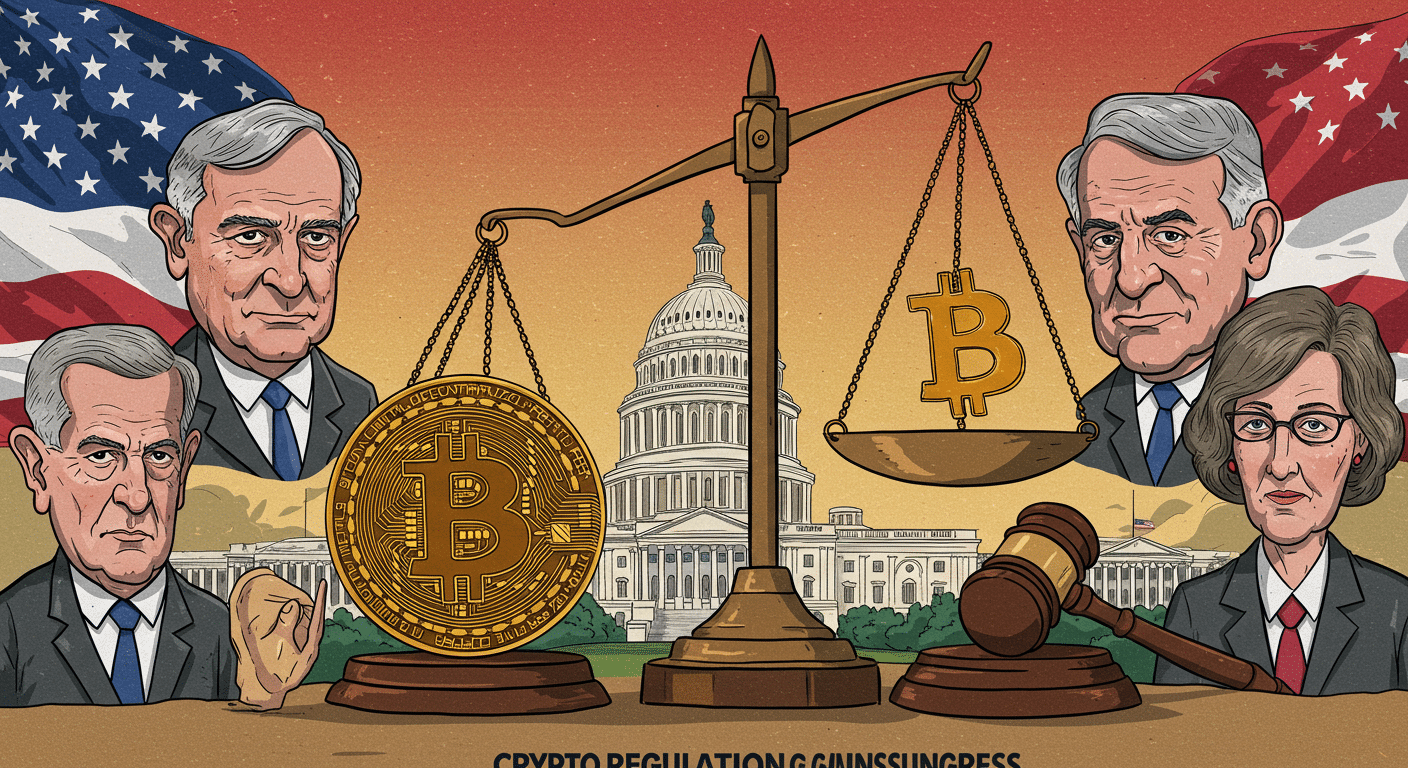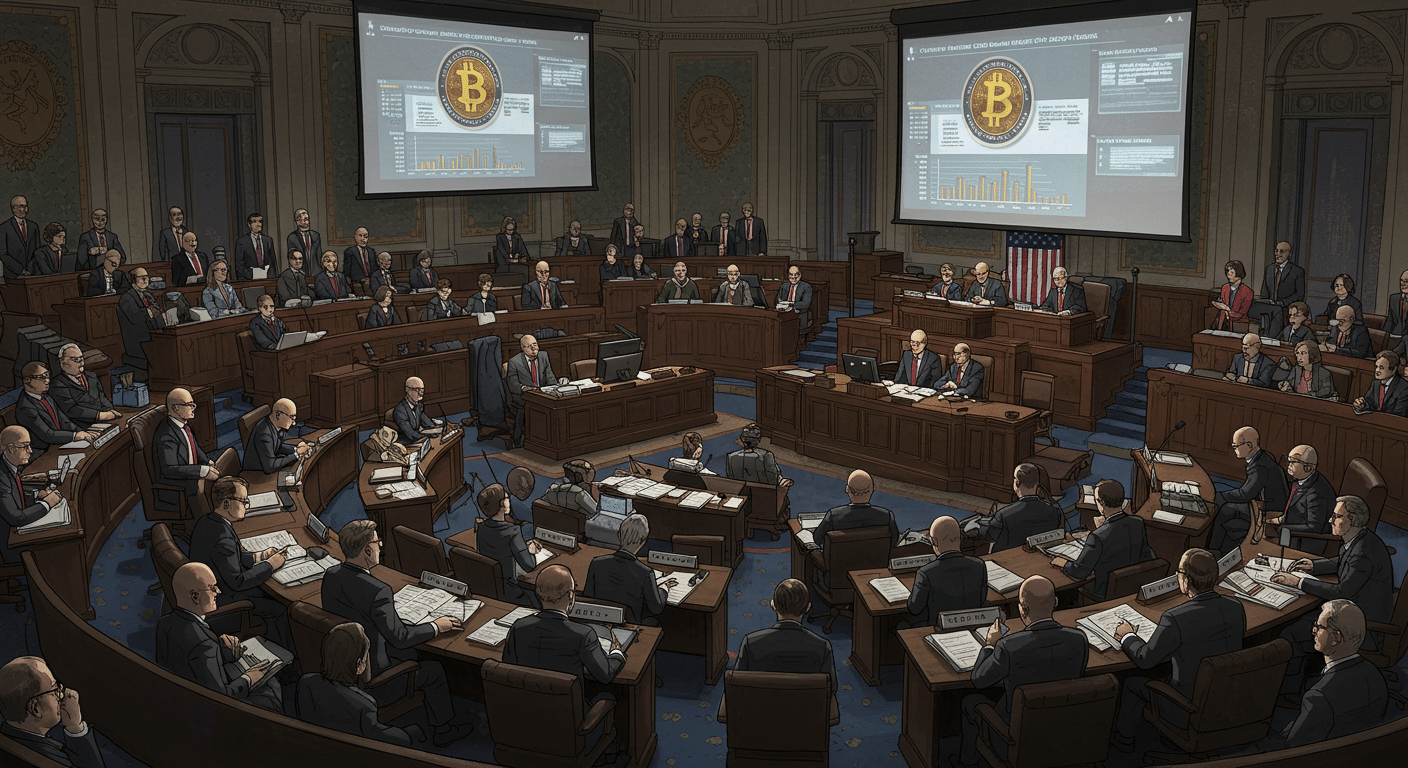 CaryptosHeadlines Media Has Launched Its Native Token CHT.
Airdrop Is Live For Everyone, Claim Instant 5000 CHT Tokens Worth Of $50 USDT.
Join the Airdrop at the official website,
CryptosHeadlinesToken.com
CaryptosHeadlines Media Has Launched Its Native Token CHT.
Airdrop Is Live For Everyone, Claim Instant 5000 CHT Tokens Worth Of $50 USDT.
Join the Airdrop at the official website,
CryptosHeadlinesToken.com
Congressman Tom Emmer re-introduced the Securities Clarity Act to establish definitive rules about digital asset oversight. Through this bill Congress works to segregate digital assets from investment contracts to fill in an enduring uncertainty in U.S. securities law. The enacted legislation creates regulatory clarity for an industry that is expanding rapidly in digital assets.
This legislation reappears before Congress during major bipartisan initiatives to reform cryptocurrency laws. The U.S. Congress has elevated its dedication to defining regulatory duties between the SEC and CFTC. The proposed law differentiates between digital assets and their associated securities contracts to settle disputes over legal jurisdiction.
The reintroduction occurs when Congress strives to finalize market structure legislation through the Financial Innovation and Technology for the 21st Century Act. When Congress first passed it, support for the FIT21 Act came from both the Democratic and Republican sides of the House. Digital asset regulation continues to advance to the top of congressional priorities across Capitol Hill.
Tom Emmer Reintroduces Securities Clarity Act
Tom Emmer and Soto reintroduced the Securities Clarity Act with bipartisan support to indicate broadening consensus. The proposed law establishes digital assets as separate from the investment contracts that offer them for purchase. The legal separation creates dependable guidelines that benefit both entrepreneurs and their investors.


Under the bill defines digital assets as “investment contract assets” that do not fit the securities classification under current legislation. Legislative officials predict the enacted law will enable blockchain protocols to operate in a legal capacity and with complete transparency. The specified terminology creates potential benefits for court systems and regulatory departments when they need to implement legal requirements uniformly.
The Securities Clarity Act continued as part of the larger FIT21 Act before it took momentum in 2024. 71 Democrats, including Nancy Pelosi, supported this bill when the House approved it. Members of Congress predict that an amended version of FIT21 will be presented in the near future, drawing strength from current bill support.
Congress Acts to Resolve Crypto Regulation Gaps
The Securities Clarity Act seeks reintroduction to overcome the continuous regulatory dispute between the SEC and CFTC. Different parts of the crypto market receive authority from the SEC and CFTC, creating ambiguities regarding jurisdictional boundaries between the agencies for businesses and investors. The bill works to minimize regulatory confusion through specific asset classification.


Legislators continue pushing digital asset companies to obtain better regulatory compliance milestones after regulatory claims turned markets into an uncertain situation. The bill restricts the SEC’s authority to supervise some tokens after establishing token non-security criteria.
The proposed approach demonstrates that U.S. lawmakers have started recognizing recent regulatory developments abroad. The United Kingdom and Switzerland now offer more transparent digital asset regulations. Congress works to update old laws and provide crypto innovators with better crypto regulation direction to keep the U.S. competitive.
Securities Clarity Act Viewed as Step Toward Broader Reform
Industry supporters consider the bill the starting point for upcoming digital asset legislation. Blockchain Association executive Ron Hammond described this bill as the “structural beginning” leading to comprehensive market structure reform, indicating growing digital asset support within federal Washington.
Bipartisan congressional backing towards crypto-related legislation has increased with the recent approval of tax relief amendments. The current law defines for lawmakers that antiquated legal specifications act as a barrier to U.S. blockchain innovation development. Through the Securities Clarity Act, a fundamental base for extended regulatory clarity should be established.
The process of developing comprehensive market structure legislation will continue to progress using the foundational elements of the current legislation. The government intends to revise FIT21 and its associated proposals into a new bill for the 2025 session. Everyone in the digital asset field, together with investors, will track how congressional authorities create new regulations in upcoming months.
FAQs
What is the Securities Clarity Act?
The Securities Clarity Act is a bipartisan bill that aims to define digital assets as separate from securities contracts.
Why is this distinction important?
This distinction would help regulators, businesses, and courts apply existing laws more clearly to new blockchain technologies.
How does this impact the SEC and CFTC?
The act reduces regulatory overlap by limiting the SEC’s jurisdiction over certain digital assets and clarifying roles with the CFTC.
Was the bill previously introduced?
Yes, the Securities Clarity Act was previously included in the Financial Innovation and Technology for the 21st Century Act.
What are the chances of the bill becoming law?
The bill has bipartisan support and growing momentum, especially as broader digital asset regulation takes shape in Congress.
Glossary
Digital Asset: A digital representation of value that can be transferred, stored, or traded using blockchain technology.
Investment Contract: A type of agreement where individuals invest in a common enterprise expecting profits from others’ efforts.
Securities Clarity Act: Proposed legislation that seeks to define when a digital asset is distinct from a securities contract.
CFTC (Commodity Futures Trading Commission): A U.S. agency overseeing commodity futures and options markets, including parts of the crypto market.
SEC (Securities and Exchange Commission): A U.S. agency regulating securities markets and protecting investors, often involved in crypto enforcement actions.
Reference:












